Do 16-year-olds have to pay taxes? How old do you have to be to start filing taxes?
No matter how old you are, if you meet certain conditions, you must file a tax return. However, dependents can be claimed on parents’ filings in some cases.

It doesn’t matter your age, if your income exceeds certain thresholds you will need to file a tax return. This is applicable to children of all ages as well, unless their income, earned and unearned, is below a limit and another taxpayer can claim them as a dependent on their return.
However, if the dependent has earned income, they may want to file a tax return in order to get a tax refund or take advantage of tax provisions. Additionally, a parent will want to make sure that adding a child’s income onto their tax return doesn’t push them into a higher tax bracket.
Also see:
- What does it mean when the IRS accepts your taxes?
- Does tax season affect the stock market?
- How much can a dependent child earn in 2021 and still be claimed?
- How is cryptocurrency taxed?
Who can be claimed as a dependent
There are some basic requisites for claiming a child on a parent’s tax return. The child must be your son, daughter, adopted child, stepchild, eligible foster child, sibling, half-sibling, step-sibling, or offspring of any of these and have a Social Security number.
They must be under age 19 at the end of the tax year, or under age 24 if a full-time student. There is no age limit if they are permanently and totally disabled. The child must live with you for more than half the year in the US and if married, not file a joint return with their spouse.
However, just because you claim your child as a dependent doesn’t mean that they don’t have to file a tax return.
#IRSFreeFile is now available, offering you tax software to file your 2021 #IRS tax return for free. https://t.co/3byJqk9fiF pic.twitter.com/upB34soPeR
— IRSnews (@IRSnews) February 2, 2022
When a child needs to file a tax return
The IRS sets out some rules for when a child must file their own tax return because of earned income, unearned income or a combination of both.
Earned income
A child must file a tax return if their earned income is more than the standard deduction. For this year's filing, the standard deduction for a dependent child is total earned income up to $12,550.
Anything earned, as in worked, under this does not need to be registered, but anything over does. Your child’s employer will most likely withhold part of their wages to pay income taxes. To get a refund of any taxes paid, the child will need to file a tax return.
If your child is self-employed and has more than $400 in income, they will need to file a tax return and may have to pay self-employment taxes of 15.3% to cover their Social Security and Medicare contributions, even if they don’t owe income tax. Likewise, if they work for an employer that is exempt from paying Social Security and Medicare taxes such as a church or religious organization and earn at least $108.28.
Spread the word about a tax credit that helps millions of people throughout the nation. Last year, 25M eligible workers and families received about $62 billion in #EITC. https://t.co/AqeTmmH4gx pic.twitter.com/K7wApaBL3K
— IRSnews (@IRSnews) February 3, 2022
Unearned income
A child must file a tax return if they have more than the $1,100 in unearned income from investments, such as capital gains tax and derivatives. If this value is under $11,000 then the unearned income can be declared on a parent's form. However, this counts towards a parent's tax, so if this money takes a parent over the next tax threshold, then more money will have to be paid to the IRS.
Both earned and unearned income
Related stories
The IRS has a calculation for combined earned and unearned income to figure out if a child needs to file.
In 2021, if your child’s earned income plus $350 is more than $1,100, and in turn that amount is less than $12,550 and their gross income, they must file a tax return. Or if their gross income is greater than $12,550.


